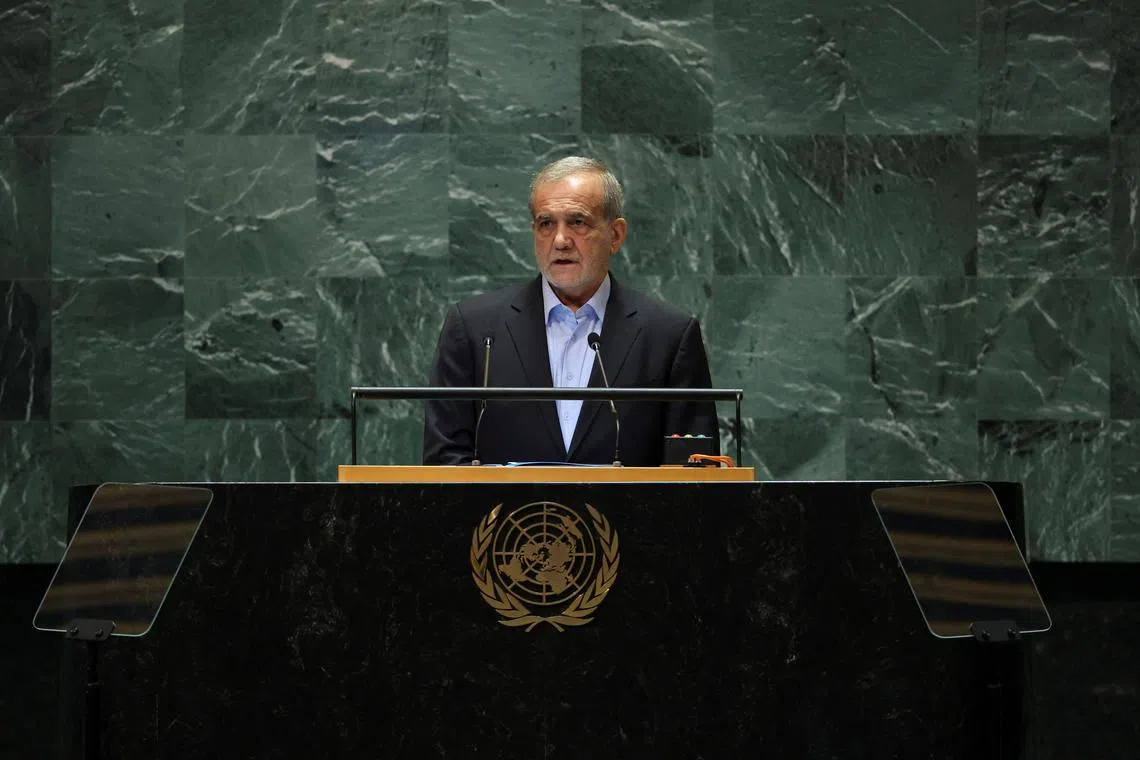Iran’s Pezeshkian says Tehran ready to work with world powers to resolve nuclear stand-off
Sign up now: Get ST's newsletters delivered to your inbox

Iranian President Masoud Pezeshkian said at the United Nations General Assembly in New York: "We seek peace for all and have no intention of conflict with any country".
PHOTO: REUTERS
NEW YORK – Iran is ready to end its nuclear stand-off with the West, President Masoud Pezeshkian told the UN General Assembly on Sept 24, while calling for an end to Russia’s war in Ukraine
Iran’s clerical establishment hopes to see an easing of US sanctions that have crippled the country’s economy.
Mr Pezeshkian said: “We are ready to engage with participants of the 2015 nuclear deal. If the deal’s commitments are implemented fully and in good faith, dialogue on other issues can follow.”
Then President Donald Trump abandoned the 2015 nuclear pact between Tehran and six world powers in 2018 and re-imposed tough sanctions on Iran. Efforts to revive the pact – which limited Iran’s ability to enrich uranium in return for a lifting of Western sanctions – have failed.
The 2015 deal had capped Iran’s uranium enrichment at 3.67 per cent purity and its stockpile of this material at 202.8kg – limits Tehran has since far exceeded.
For Britain, France and Germany, which remain parties to the nuclear deal, there is a sense that Tehran’s leadership will not change course and that a broader accord encompassing the nuclear programme and Iran’s geopolitical role is unrealistic for now.
The US, its European allies and Israel accuse Tehran of using its nuclear programme as a veil for efforts to try to develop the capability to produce weapons. Iran says its nuclear programme is for peaceful purposes only.
UN nuclear watchdog chief Rafael Grossi, who held talks with Iranian Foreign Minister Abbas Araghchi – one of the key architects of the 2015 accord – on the sidelines of the UN General Assembly, said on Sept 24 that he had sensed a greater willingness by Iranian officials to engage with the agency in a more meaningful way.
Several longstanding issues have dogged relations between Iran and the International Atomic Energy Agency, including Tehran’s barring of uranium-enrichment experts on the inspection team and its failure for years to explain uranium traces found at undeclared sites.
Mr Grossi said he wanted to make real progress in restoring proper technical discussions with Iran quickly and was aiming to travel to Tehran in October to meet Mr Pezeshkian.
Tehran’s relations with the West have worsened since the Iranian-backed Hamas militant group attacked southern Israel on Oct 7 and as Tehran increased its support for Russia’s war in Ukraine.
Mr Pezeshkian, a relatively moderate politician who took office in August promising a pragmatic foreign policy, criticised Iran’s arch-foe Israel for what he called “its genocide in Gaza”.
He said: “It is imperative that the international community should immediately... secure a permanent ceasefire in Gaza and bring an end to the desperate barbarism of Israel in Lebanon, before it engulfs the region and the world.”
An Israeli air strike on Beirut killed a senior commander of the Iranian-backed Hezbollah militant group in Lebanon on Sept 24 as cross-border rocket attacks by both sides increased fears of a full-fledged war.
“We seek peace for all and have no intention of conflict with any country... Iran opposes war and emphasises the need for an immediate cessation of military conflict in Ukraine,” Mr Pezeshkian said.
Russia has fostered closer ties with Iran since the start of its war with Ukraine and has said it is preparing to sign a wide-ranging cooperation agreement with the Islamic state.
Iran has brokered secret talks between Russia and Yemen’s Houthi rebels to transfer anti-ship missiles to the militant group, three Western and regional sources said, a development that highlights Tehran’s deepening ties with Moscow. REUTERS


